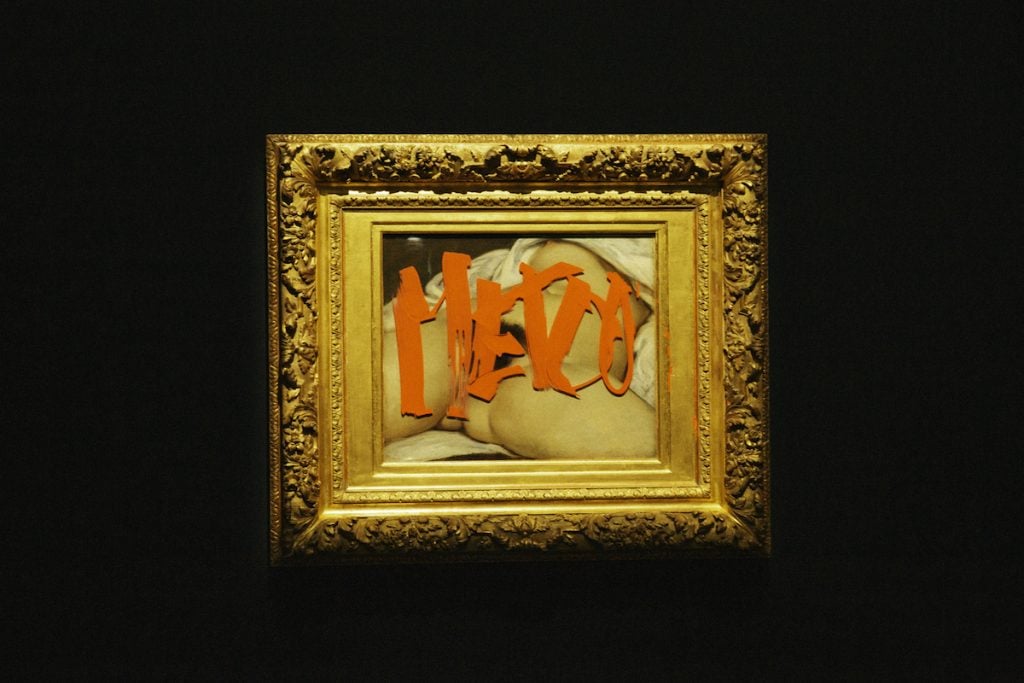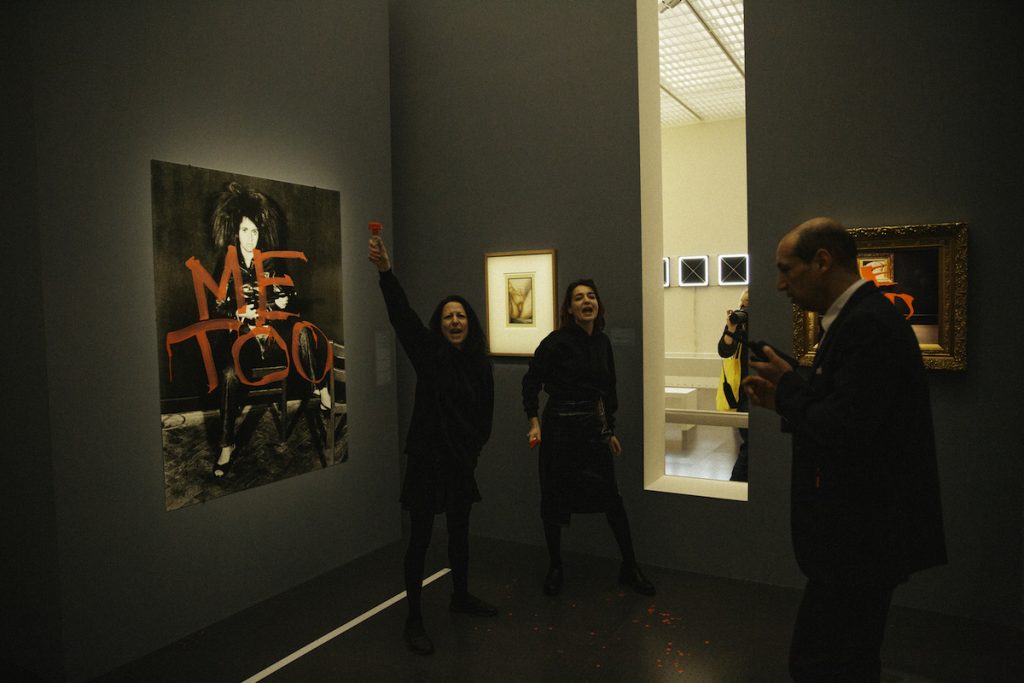Art World
Controversial Courbet Tagged With ‘Me Too’ Graffiti As Part of an Artist’s Performance
Artist Deborah de Robertis claims the action was a feminist performance and denounced the predatory behavior of men in the art world.

Artist Deborah de Robertis claims the action was a feminist performance and denounced the predatory behavior of men in the art world.

Holly Black

Two women were arrested by French police on Monday at the Centre Pompidou-Metz after they targeted The Origin of the World (1866) by Gustave Courbet, a provocative painting centered on a nude torso and exposed vulva, spray painting it with the words “Me Too.”
Police said that the Courbet was protected by a “glass pane” and will be assessed for damage. It was on loan from the Centre Pompidou in Paris as part of an exhibition on the French psychoanalyst Jacques Lacan, who once owned the painting.
The women were performance artists working with artist and activist Deborah de Robertis, who has previously made headlines for appearing naked in front of Édouard Manet’s Olympia (1863) and the Mona Lisa, in acts of performance-protest. A video of the protest has been released on Vimeo.
De Robertis organized the action as part of a performance work called You Don’t Separate the Woman from the Artist. The title is an apparent nod to ongoing debates surrounding whether art can be appreciated regardless of the ill actions of the creator—specifically men who are abusive towards women.
The artist told the AFP the actions were a feminist performance, carried out because “the very closed world of contemporary art has remained largely silent until now.”
In a statement, shared via text message and available on her blog, de Robertis denounced the behavior of men described as “predators” in the art world, citing the art critic and curator Bernard Marcadé, who co-organized the Centre Pompidou-Metz exhibition.
Marcadé did not respond to a request for comment.
The Courbet was one of five works of art within the Lacan show to be tagged with the “Me Too” phrase, which is associated with the international movement against sexual violence that came to prominence in 2017. Pieces by Valie Export, Louise Bourgeois, and Rosmarie Trockel were also tagged, along with a photograph by de Robertis, which was taken during the performance Mirror of Origin (2014). The artist is seen posing underneath the Courbet painting at the Musée D’Orsay, while exposing her genitals.
Following the incidents, the activists were dragged away by security guards while chanting “Me Too.”

Protestors at the Pompidou-Metz chanting “Me Too” in front of Valie Export’s vandalized work. Courtesy Deborah de Robertis.
“With all due respect to feminist movements, we are shocked to see the vandalization of works by artists, particularly feminist artists, who are at the heart of struggles in the history of art,” said Chiara Parisi, director of the Centre Pompidou-Metz. “We condemn acts of vandalism against artworks conserved and presented in museums, which also target the frontline staff.”
Among the other works targeted was Valie Export’s Aktionshose: Genitalpanik (1969/2021), which shows the artist sitting in a chair with her vulva exposed. The avant-garde Austrian artist released a statement on social media on Tuesday denouncing the destruction of the work.
“Every work of art has its own language, a language that artists give their works of art,” Export said. “It is an autonomous language, an autonomous language that cannot be interfered with without the consent of the artist. If this autonomous language is violated by an intervention not authorized by the artist, it is an unauthorized intervention and the autonomy of the artwork is destroyed.”
An embroidered work by Annette Messager called I Think Before I Suck (1991) was also believed to have been stolen by a third accomplice, who was not detained, according to French authorities.
De Robertis shared a video on her social media featuring footage of Marcadé she alleges is from a film she made 15 years ago. The accompanying caption claims that the artist is now in possession of Messager’s artwork, which is reportedly owned by the critic, and is waiting to be contacted by the authorities.
“I call on all women, with or without vulvas, all intersex, trans and non-binary people, and all underrepresented people—whether artists, assistants or interns in the art world—to dare to express yourself,” de Robertis said.
In 2020, a French court sentenced de Robertis to pay a €2,000 ($2,150) fine for appearing naked in 2018 in front of a Catholic pilgrimage site dedicated to the Virgin Mary in the town of Lourdes in southwest France. A case against her was dropped in 2017 after she showed her vulva in front of the Mona Lisa at the Louvre.